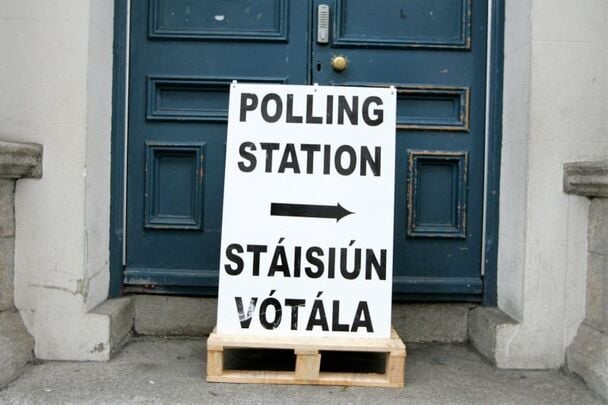Sinn Féin is urging the Irish Government to act on Irish Presidential voting rights for Irish citizens in Northern Ireland following the party's successful motion on the matter in the Northern Ireland Assembly this week.
The Sinn Féin motion was introduced in the Northern Ireland Assembly on Tuesday and passed 46 to 25.
Michelle O'Neill, the First Minister of Northern Ireland and the Vice President of Sinn Féin, has now written to Taoiseach Micheal Martin, "urging him to make the extension of Irish Presidential voting rights to Irish citizens in the north a priority for his government."
O'Neill said in a statement on Friday: “It is a glaring anomaly that an Irish citizen living in the north can stand for election as President of Ireland, can be elected as President of Ireland, but cannot vote to elect the President of Ireland.
“The Assembly decisively voted in support of the right of citizens in the north to vote for the President of Ireland.
“The office of the President of Ireland is held in the highest regard and respect in Ireland, among the Irish diaspora and across the world. That regard and respect has a particular significance and immediacy for Irish citizens in the north who have historically been denied participation in the life of their own nation by the historic and undemocratic injustice of partition.”
O'Neill noted that she welcomed recent comments by Ireland's Tánaiste Simon Harris, who said he supported the principle and would be discussing it with government colleagues.
'It is a glaring anomaly that an Irish citizen living in the north can stand for election as President of Ireland, can be elected as President of Ireland but cannot vote to elect the President of Ireland' - @moneillsf https://t.co/AUkoTAVyhT
— Sinn Féin (@sinnfeinireland) May 9, 2025
Also on Friday, Pearse Doherty TD, Sinn Féin spokesperson on Finance, said: “The government has a constitutional duty to uphold the citizenship rights of everybody born on the island of Ireland.
"This is about equality, recognition and democratic participation.
“So the time for excuses is over. The government must give a timeline and set a date for the referendum, and finally act on the 12-year-old commitment to extend voting rights in presidential elections to citizens in the North.”
Government must now act on commitments to extend presidential voting rights to citizens in the North – @PearseDoherty
"The time for excuses is over. The government must give a timeline and set a date for the referendum."https://t.co/boC3skGJFx
— Sinn Féin (@sinnfeinireland) May 9, 2025
Voting rights for the Irish in the North and abroad
Unlike citizens in other countries, Irish citizens who are not living in the Republic of Ireland cannot cast votes in Irish elections from abroad - including from Northern Ireland, where, as per the Good Friday Agreement, people can choose to be Irish, British, or both.
"Subject to a limited number of exceptions, Irish citizens resident outside the State do not have the right to vote at elections or at referendums held in the State," Ireland's Department of Foreign Affairs says.
This is in relation to Ireland’s Electoral Act of 1992, which dictates that Irish citizens who have left Ireland for no longer than 18 months are still entitled to vote.
Thus, Irish citizens living outside of the Irish State - including in Northern Ireland - for more than 18 months are not permitted to vote in Irish elections; it's an issue that has been the focus of debate for many years.
The issue of voting rights for Irish citizens abroad has been simmering for years. Despite organized efforts from advocates, as well as promises from leading politicians, a referendum has yet to be held.
A 2013 report from the Irish Convention on the Constitution recommended that Irish citizens resident outside of Ireland should have the right to vote in Irish presidential elections.
In 2016, VotingRights.ie was founded to advance the cause of emigrant voting. The global coalition of Irish emigrant groups wrote to then-Taoiseach Enda Kenny calling for a referendum on the matter in 2017.
During a St. Patrick's Day visit to the US in March 2017, Taoiseach Enda Kenny confirmed the Government had decided to move forward with plans to hold a referendum to give the right to vote in presidential elections to Irish citizens abroad, including those in Northern Ireland.
That same month, Ireland's Department of Housing, Planning, Community and Local Government and Department of Foreign Affairs and Trade published an Options Paper which outlined seven options for eligibility criteria and associated implementation measures.
In 2018, it was announced that it was intended for the referendum to be held in late May / early June of 2019, on the same date as the local and European elections.
However, in February 2019, the government decided that the referendum would be postponed due to Brexit.
In September 2019, the Thirty-ninth Amendment of the Constitution (Presidential Elections) Bill 2019 was initiated in Dáil to facilitate the holding of a referendum, but the Bill lapsed with the dissolution of the 32nd Dáil Éireann.
However, the Bill was later restored to the Dáil Order Paper.
Providing an update on the Bill last October, TD Sean Fleming, Minister of State at the Department of Foreign Affairs, said: "The commitment set out in the Programme for Government to hold a referendum on extending the franchise at presidential elections to Irish citizens living outside of the State remains in place.
"The enabling legislation required in order to hold such a referendum is currently before Dáil Éireann (the Thirty-Ninth Amendment of the Constitution (Presidential Elections) Bill) and its timing remains under consideration.
"Once the legislation has been approved by the Dáil and Seanad, the Minister for Housing, Local Government and Heritage can then make an order setting the day upon which a referendum will take place."
Also in October, a public petition on voting for Irish-born citizens abroad was considered by the Joint Committee on Public Petitions and the Ombudsmen in October.
However, the Bill lapsed again upon the dissolution of the 33rd Dáil Éireann.
Unlike the previous Programme for Government, the newest Programme for Government, which was adopted earlier this year, does not provide for a referendum on voting rights for the Irish diaspora, a move that was slammed by advocates.
The Sinn Féin motion won support in the Northern Ireland Assembly not long after Irish political party Aontú launched a Bill that seeks to amend the Irish Constitution to allow Irish citizens in the North of Ireland to be able to vote in Ireland's Presidential elections.
Peadar Tóibín, the leader of Aontú and TD for Meath West, said the purpose of the Bill is to "ensure that all adult citizens of Ireland who are (i) entitled under current law to vote in a Dáil or Presidential election or (ii) ordinarily resident outside the State but in the island of Ireland, have the right to vote in Presidential elections, subject to compliance with relevant electoral law."




Comments